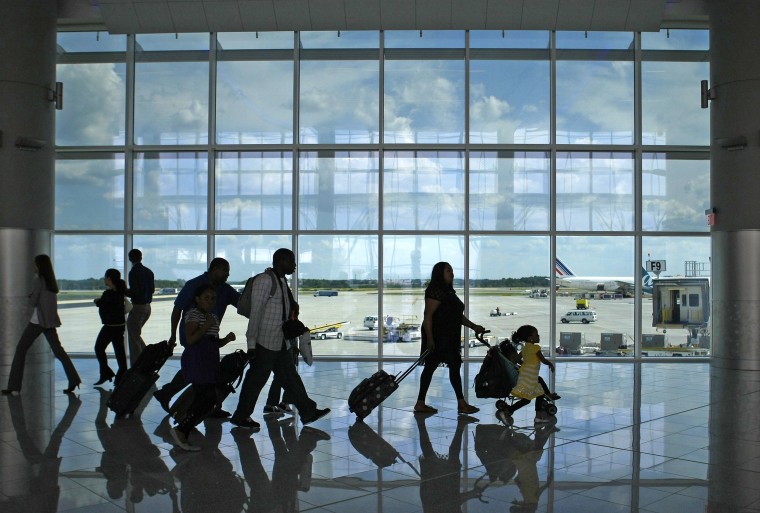Quietly dreading your next business trip? You're not alone. A recent study found that employees who frequently travel may be sick of their "hypermobile" work lives, but don't address the issue because they feel powerless.
The new research from England's University of Surrey determined two types of employees: the flourishing hypermobile and the floundering hypermobile.
“Those ‘flourishing’ viewed business travel as a source of happiness and a valued part of their identity,” said Dr. Scott Cohen, lead author of the research and head of the department of tourism and events at the University of Surrey. “Those ‘floundering’ saw it as a source of unhappiness, and a danger to their health and family/social life.”
Disrupted Routines, Longer Work Days, and Lost Family Time
Frequent travel can take its toll on anyone, so it's no wonder that employees may be struggling with it.
“Business travel can be disruptive to employees’ regular sleep, exercise and eating — all of which can take a toll on their overall health and well-being," said Dr. William Siegart, medical director at travel risk management provider On Call International.
What's more, when you're on the road, the concept of a 9-to-5 day goes out the window.
"Working long hours well beyond the typical 9-to-5 are par for the course, and flight delays and logistics compound the stress," said Joost Schreve, co-founder and CEO of the travel platform kimkim, adding that even ostensibly glamorous trips, like a week in Tokyo, can be exhausting and "wreak havoc on everything from your sleeping and eating habits to relationships with friends and family."
Lawsuits in the Future?
Employees who feel they're spending too much time on the road, and/or that their health is at stake from frequent business travel, could have a case in court.
"Litigation is certainly possible," said Thomas Joo, a law professor at University of California, Davis. "It's well accepted that air travel has possible health effects. Starting about 10 years ago, we saw some lawsuits including class action [concerning] deep-vein thrombosis against airlines. There were a lot of settlements, and it was a big deal. If you see that there's a health problem association with flying, and that your bosses are exposing you to a health hazard, [that can serve] as logic to sue an employer."
But we have yet to see lawsuits filed against companies specifically based on the accusation of excessive business travel. This is because there’s no law against such travel.
Related: Trump's Travel Ban Deters Tourists — and Their Dollars
“There is no U.S. law that in general places limits or conditions on the travel associated with work,” said Richard Reice, partner at Hoguet Newman Regal & Kenney, LLP. “Even in this day where there is greater awareness of a positive work-life balance, there is no cause of action for ‘excessive business travel’ and determining how much is ‘too much’ in order to establish a violation.”
What’s more, the health hazards associated with flying are still controversial. Reice notes that there is “an absence of definitive research on the negative health impacts of excessive travel.”
And then of course there’s the problem that the study noted: the floundering hypermobile is unlikely to confront his or her employer.
“People see themselves locked into business travel as part of the job, and speaking out might put them in the ‘slow lane’ to job progression,” study author Cohen told NBC News.
Companies Can Do Better
So, what’s going to happen? Those of us who aren’t suited for or are worn down by frequent business travel are just going to stay miserable? Or look for work that doesn’t require so much time on the road? Possibly. But we should also put the pressure on companies to do right by us. This doesn’t necessarily mean reducing our travel; it can simply mean improving the conditions of our travel.
"Companies should consider ways to make traveling for their road warriors more palpable," said Craig Fichtelberg, president and co-founder of AmTrav. "Many companies require tight travel polices that limit the amount that can be spent on an airline or hotel stay. The more rules they pile on, the more stress and strain this puts on the traveler.”
Loosening up the reins, allowing for flexibility in schedule, and springing for upgrades can make a positive difference.
Related: Want to Travel the World for Almost Nothing? Try Housesitting
“Consider allowing travelers to be bumped up to economy-plus seating or even business class depending on the length of the flight,” suggested Fichtelberg. “Consider four-star hotels as opposed to two- or three-star hotels, [and] even allow for an extra personal day on the road for the traveler to get acclimated. The old school mentality was to tighten the rules to save money on travel, when in essence it makes more economic sense to loosen the rules. Business travel should be perceived as a company benefit — not a liability.”
Who’s Gonna Step Up?
Let’s be realistic though, what average company is going to spring for fancy hotels and personal days abroad when it’s flying people out on a routine basis? And what already inhibited employee is going to step up and ask for more? Something’s got to give, and it’s probably going to give in the courtroom.
Since there’s no law against excessive business travel, an employee would need to show proof in the courtroom of the negative effects of excessive business travel, which could then lead to a law against it.
“The tipping point for employers will be when there is successful litigation causing an employer to pay out for damaging the health of an employee by forcing him or her to travel too frequently,” said Cohen. “Then we’ll begin to see the rush by employers to put safeguards in place, so that it doesn’t happen to them.”
